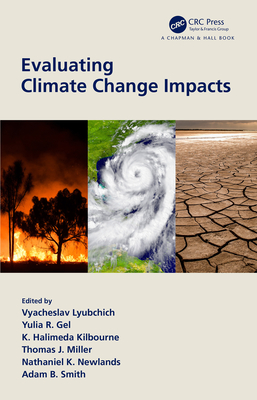Machine Learning Methods in the Environmental Sciences: Neural Networks and Kernels (環境科學中的機器學習方法:神經網絡與核函數)
William W. Hsieh
- 出版商: Cambridge
- 出版日期: 2018-03-01
- 定價: $1,420
- 售價: 9.0 折 $1,278
- 語言: 英文
- 頁數: 363
- 裝訂: Paperback
- ISBN: 1108456901
- ISBN-13: 9781108456906
-
相關分類:
Machine Learning
立即出貨 (庫存=1)
買這商品的人也買了...
-
 $1,188Fedora 11 and Red Hat Enterprise Linux Bible (Paperback)
$1,188Fedora 11 and Red Hat Enterprise Linux Bible (Paperback) -
 離散數學 最新修訂版
離散數學 最新修訂版$800$680 -
 Python 設計模式深入解析 (Mastering Python Design Patterns)
Python 設計模式深入解析 (Mastering Python Design Patterns)$360$281 -
 不再聽不懂!圖解網站建置與開發
不再聽不懂!圖解網站建置與開發$450$356 -
 Python 函式庫語法範例字典
Python 函式庫語法範例字典$450$383 -
 演算法之美:隱藏在資料結構背後的原理 (C++版)
演算法之美:隱藏在資料結構背後的原理 (C++版)$650$507 -
 為你自己學 Git
為你自己學 Git$500$390 -
 Density Ratio Estimation in Machine Learning
Density Ratio Estimation in Machine Learning$2,080$1,976 -
 Python 技術者們 - 實踐! 帶你一步一腳印由初學到精通
Python 技術者們 - 實踐! 帶你一步一腳印由初學到精通$650$553 -
 Python 與 LINE Bot 機器人全面實戰特訓班 (附203分鐘影音教學/範例程式)
Python 與 LINE Bot 機器人全面實戰特訓班 (附203分鐘影音教學/範例程式)$520$411 -
 Python 技術者們 - 練功!老手帶路教你精通正宗 Python 程式 (The Quick Python Book, 3/e)
Python 技術者們 - 練功!老手帶路教你精通正宗 Python 程式 (The Quick Python Book, 3/e)$780$663 -
 設計師都該懂的包容性網頁 UI/UX 設計模式:知名設計師教你親和性網頁的實作祕密
設計師都該懂的包容性網頁 UI/UX 設計模式:知名設計師教你親和性網頁的實作祕密$450$351 -
 邁向 Linux 工程師之路:Superuser 一定要懂的技術與運用, 2/e (How Linux Works: What Every Superuser Should Know, 2/e)
邁向 Linux 工程師之路:Superuser 一定要懂的技術與運用, 2/e (How Linux Works: What Every Superuser Should Know, 2/e)$600$468 -
 JavaScript 技術手冊
JavaScript 技術手冊$560$442 -
 PowerShell 流程自動化攻略 (Powershell for Sysadmins: A Hands-On Guide to Automating Your Workflow)
PowerShell 流程自動化攻略 (Powershell for Sysadmins: A Hands-On Guide to Automating Your Workflow)$500$395 -
 精通資料視覺化 : 用試算表與程式說故事 (Hands-On Data Visualization: Interactive Storytelling from Spreadsheets to Code)
精通資料視覺化 : 用試算表與程式說故事 (Hands-On Data Visualization: Interactive Storytelling from Spreadsheets to Code)$680$537 -
 打下最紮實 AI 基礎不依賴套件:手刻機器學習神經網路穩健前進
打下最紮實 AI 基礎不依賴套件:手刻機器學習神經網路穩健前進$1,200$948 -
 強健的 Python|撰寫潔淨且可維護的程式碼 (Robust Python: Write Clean and Maintainable Code)
強健的 Python|撰寫潔淨且可維護的程式碼 (Robust Python: Write Clean and Maintainable Code)$680$537 -
 Template Metaprogramming with C++: Learn everything about C++ templates and unlock the power of template metaprogramming (Paperback)
Template Metaprogramming with C++: Learn everything about C++ templates and unlock the power of template metaprogramming (Paperback)$1,900$1,805 -
 持續 API 管理|在不斷演變的生態系統中做出正確決策, 2/e (Continuous API Management: Making the Right Decisions in an Evolving Landscape, 2/e)
持續 API 管理|在不斷演變的生態系統中做出正確決策, 2/e (Continuous API Management: Making the Right Decisions in an Evolving Landscape, 2/e)$580$458 -
 邁向 Linux 工程師之路:Superuser 一定要懂的技術與運用, 3/e (How Linux Works : What Every Superuser Should Know, 3/e)
邁向 Linux 工程師之路:Superuser 一定要懂的技術與運用, 3/e (How Linux Works : What Every Superuser Should Know, 3/e)$780$608 -
 精通無瑕程式碼:工程師也能斷捨離!消除複雜度、提升效率的 17個關鍵技法 (The Art of Clean Code: Best Practices to Eliminate Complexity and Simplify Your Life)
精通無瑕程式碼:工程師也能斷捨離!消除複雜度、提升效率的 17個關鍵技法 (The Art of Clean Code: Best Practices to Eliminate Complexity and Simplify Your Life)$600$468 -
 Artificial Intelligence: Foundations of Computational Agents, 3/e (Hardcover)
Artificial Intelligence: Foundations of Computational Agents, 3/e (Hardcover)$3,150$2,993 -
 容器底層原理運作 - containerd 剖析實戰精要
容器底層原理運作 - containerd 剖析實戰精要$800$632 -
 新世代關聯 -- 圖資料庫理論精解 + 開發實務
新世代關聯 -- 圖資料庫理論精解 + 開發實務$980$774
相關主題
商品描述
Machine learning methods originated from artificial intelligence and are now used in various fields in environmental sciences today. This is the first single-authored textbook providing a unified treatment of machine learning methods and their applications in the environmental sciences. Due to their powerful nonlinear modeling capability, machine learning methods today are used in satellite data processing, general circulation models(GCM), weather and climate prediction, air quality forecasting, analysis and modeling of environmental data, oceanographic and hydrological forecasting, ecological modeling, and monitoring of snow, ice and forests. The book includes end-of-chapter review questions and an appendix listing web sites for downloading computer code and data sources. A resources website containing datasets for exercises, and password-protected solutions are available. The book is suitable for first-year graduate students and advanced undergraduates. It is also valuable for researchers and practitioners in environmental sciences interested in applying these new methods to their own work.
Preface Excerpt
Machine learning is a major subfield in computational intelligence (also called artificial intelligence). Its main objective is to use computational methods to extract information from data. Neural network methods, generally regarded as forming the first wave of breakthrough in machine learning, became popular in the late 1980s, while kernel methods arrived in a second wave in the second half of the 1990s. This is the first single-authored textbook to give a unified treatment of machine learning methods and their applications in the environmental sciences.
Machine learning methods began to infiltrate the environmental sciences in the 1990s. Today, thanks to their powerful nonlinear modeling capability, they are no longer an exotic fringe species, as they are heavily used in satellite data processing, in general circulation models (GCM), in weather and climate prediction, air quality forecasting, analysis and modeling of environmental data, oceanographic and hydrological forecasting, ecological modeling, and in the monitoring of snow, ice and forests, etc.
This book presents machine learning methods and their applications in the environmental sciences (including satellite remote sensing, atmospheric science, climate science, oceanography, hydrology and ecology), written at a level suitable for beginning graduate students and advanced undergraduates. It is also valuable for researchers and practitioners in environmental sciences interested in applying these new methods to their own work.
Chapters 1-3, intended mainly as background material for students, cover the standard statistical methods used in environmental sciences. The machine learning methods of chapters 4-12 provide powerful nonlinear generalizations for many of these standard linear statistical methods. End-of-chapter review questions are included, allowing readers to develop their problem-solving skills and monitor their understanding of the material presented. An appendix lists websites available for downloading computer code and data sources. A resources website is available containing datasets for exercises, and additional material to keep the book completely up-to-date.
About the Author
WILLIAM W. HSIEH is a Professor in the Department of Earth and Ocean Sciences and in the Department of Physics and Astronomy, as well as Chair of the Atmospheric Science Programme, at the University of British Columbia. He is internationally known for his pioneering work in developing and applying machine learning methods in environmental sciences. He has published over 80 peer-reviewed journal publications covering areas of climate variability, machine learning, oceanography, atmospheric science and hydrology.
商品描述(中文翻譯)
機器學習方法源於人工智慧,現今在環境科學的各個領域中被廣泛應用。這是第一本由單一作者撰寫的教科書,提供了機器學習方法及其在環境科學中的應用的統一介紹。由於其強大的非線性建模能力,機器學習方法現今被用於衛星數據處理、大氣循環模型(GCM)、天氣和氣候預測、空氣品質預報、環境數據分析和建模、海洋和水文預報、生態建模以及雪、冰和森林的監測等領域。本書包含章末的復習問題以及附錄列出的下載電腦代碼和數據來源的網站。還提供了包含練習數據集和受密碼保護的解答的資源網站。本書適合研究生一年級和高年級本科生閱讀,同時也適用於對將這些新方法應用於自己工作的環境科學研究人員和從業人員有興趣的讀者。
前言摘錄:
機器學習是計算智能(也稱為人工智慧)的一個主要子領域。其主要目標是使用計算方法從數據中提取信息。神經網絡方法通常被認為是機器學習的第一波突破,於1980年代末變得流行,而核方法則在1990年代下半葉成為第二波突破。這是第一本由單一作者撰寫的教科書,統一介紹了機器學習方法及其在環境科學中的應用。
機器學習方法在1990年代開始進入環境科學領域。如今,由於其強大的非線性建模能力,它們不再是一種異數,而是在衛星數據處理、大氣循環模型(GCM)、天氣和氣候預測、空氣品質預報、環境數據分析和建模、海洋和水文預報、生態建模以及雪、冰和森林的監測等領域中被廣泛應用。
本書介紹了機器學習方法及其在環境科學中的應用(包括衛星遙感、大氣科學、氣候科學、海洋學、水文學和生態學),適合初級研究生和高年級本科生閱讀。對於對將這些新方法應用於自己工作的環境科學研究人員和從業人員也具有價值。
第1章至第3章主要作為學生的背景材料,介紹了環境科學中常用的標準統計方法。第4章至第12章的機器學習方法為這些標準線性統計方法提供了強大的非線性推廣。章末的復習問題可幫助讀者培養解決問題的能力並監測對所介紹內容的理解。附錄列出了可下載電腦代碼和數據來源的網站。還提供了包含練習數據集和保持書籍完全更新的其他材料的資源網站。
關於作者:
WILLIAM W. HSIEH是英屬哥倫比亞大學地球與海洋科學系和物理與天文學系的教授,也是大氣科學計劃的主席。他以在環境科學中開發和應用機器學習方法的開創性工作而享譽國際。他發表了80多篇經同行評審的期刊論文,涵蓋氣候變異性、機器學習、海洋學、大氣科學和水文學等領域。












